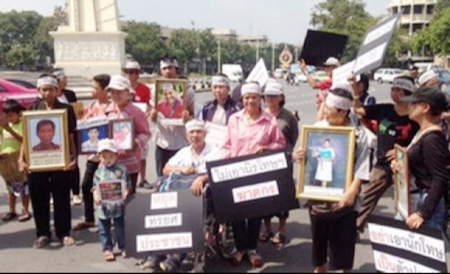BANGKOK, Oct 24 – Relatives of victims in the 2010 political upheaval today vehemently attacked a parliamentary move for a blanket amnesty covering all those who ordered and were involved in the crackdown against civil protesters.
Nearly 100 people were reported killed in the months-long incident, mainly at the Ratchaprasong area, one of Bangkok’s busiest shopping venues.

Payao Akhard, whose daughter died in the unrest, submitted a letter of protest to Samart Kaewmeechai, chairman of the House committee scrutinising the Amnesty Bill, demanding a review of the revised version which, she said, deviated from the original bill.
She said the ruling Pheu Thai Party promised during its pre-election campaign that it would not pardon those who ordered suppression of protesters in the 2010 political demonstrations.
Mrs Payao said she was extremely disappointed with the House scrutiny committee’s decision to grant a blanket amnesty to those people.
She called on leaders of the pro-government Red Shirt group to jointly protest against the scrutinised Amnesty Bill.
Pusadee Ngamkham, relative of another political victim, said her group would switch to support anti-government movements if the House scrutiny committee refused to change the revised version.
When the scrutiny committee resumed meeting this morning, Pheu Thai MP Weng Tochirakarn demanded that the committee reverse its revision, insisting that those who ordered suppression of protestors and wrongdoers in the disputes, including the so-called men in black, should not be pardoned.
Mr Weng’s proposal was advocated by opposition Democrat MPs including former prime minister Abhisit Vejjajiva.
The majority of the committee, however, stood firm on retaining the scrutinised version and said details should be debated in the second reading in the House of Representatives.
Regarding whether the Amnesty Bill was classified as financial legislation and whether the state must return more than Bt50 billion seized from ousted premier Thaksin Shinawatra, the scrutiny committee chairman insisted that it was not a financial bill, and did not have to be endorsed by the prime minister as stipulated by the law if that was the case.
The opposition chief whip, Jurin Laksanavisit, announced that his party would steadfastly protest the Amnesty Bill.
“Even if it is passed into law, we will seek a Constitution Court injunction,” he said.
Referring to a statement by Pheu Thai leader Charupong Ruangsuwan that the government would issue a royal decree on amnesty if Parliament rejects the bill, Mr Jurin said insisting to promulgate the bill would be a challenge to the people’s will – a similar phenomenon as before the coup against the Thaksin government on September 19, 2006.




